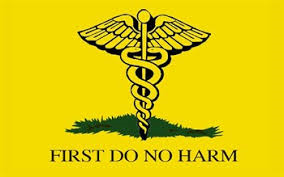Healthcare Discrimination for All
 Posted On
Posted On
Throughout the health care industry, patients discriminate against doctors, doctors discriminate against patients, and healthcare workers discriminate against each other.
Discrimination of Physicians by Patients or Their Families

The Journal of Academic Medicine published a 2017 survey of Stanford pediatric residents responding to questions about prejudice. Approximately 15% of pediatric residents experienced prejudice by patients. The discrimination hinged on gender, religion, and race.
In “Racism in Medicine: An Open Secret,” CNN took a close look at the discrimination that doctors experienced in 2016. In one situation, at Lucile Packard Children’s Hospital Stanford, an intern reported a problem to a supervising doctor, “[T]he dad just looked at my name tag and asked, ‘Oh, is that a Jewish last name? I don’t want a Jewish doctor.'” Although the intern wasn’t Jewish, the supervising physician, Dr. Emily Whitgob, was Jewish.
Nurses in the neonatology unit of Flint, Michigan’s, Hurley Medical Center, filed suit against the hospital for adhering to a swastika-tattooed father’s request that no black nurses attend to his newborn infant. The nurses won the case.
Family physician Sheila Ramanathan highlights discrimination in many of her articles appearing in the New York State Academy of Family Physicians’ publication, Family Doctor. In one case, a Muslim colleague found herself relentlessly questioned, insulted, and even attacked by patients, because she wore a headscarf.
Ramanathan reports on overt bigotry expressed towards doctors of African-American, African, Indian, and Jewish heritage, or who are female.

Health Care Workers Discriminate Against Each Other
Almost 60% of doctors in training shared that they’ve experienced mistreatment, harassment, or discrimination in the workplace. Of course, these situations are different from hospital to hospital. In 2017, a survey questioned 6,000 women physicians about workplace discrimination. Results showed that 78 percent had experienced discrimination while working. Gender discrimination was reported by 66%, while 35% of women recognized maternal bias. This discrimination shows up in salary disparages as well.
Discrimination of Patients by Healthcare Providers
Studies in various countries, using multiple methods, found implicit bias including race and gender in health care professionals correlated with indicators of health care and the adverse effects on client interaction, according to Jada Vanderpool, writer, and sister-blogger.
In the U.S., primarily, health care providers appeared to have more of a positive attitude towards white patients than patients of color.
A University of Pittsburgh School of Medicine study found that physicians give less compassionate nonverbal cues when treating seriously ill black patients compared to their white counterparts. The study, which included actor caregivers and patients, found that physicians (the study was primarily made up of white physicians) were more likely to stand by the patient’s bedside of white patients as opposed to black patients.
“Poor nonverbal communication — something the physician may not even be aware he or she is doing — could explain why many black patients perceive discrimination in the health care setting,” said Dr. Ann Barnato, M.D., M.P.H. who led the study.
As a result, many minorities are suppressing their medical concerns, not receiving the support needed from health care professionals, and discovering health disparities later.
“Minorities, in general, don’t have a lot of faith that they’re receiving the best care they could,” said Abigail Sewell, a postdoctoral research fellow at the University of Pennsylvania’s Population Studies Center. “Number two, and I think more important, the fact that they think their doctors don’t care means they feel their doctors aren’t taking into consideration their personal lives.”
Can we fix this?
“To fight racism and discrimination, we all need to recognize, name, and understand these attitudes and actions,” wrote Monique Tello, MD, M.P.H., health contributing editor at Harvard Health Publishing “We need to be open to identifying and controlling our own implicit biases. We need to be able to manage overt bigotry safely, learn from it, and educate others. These themes need to be a part of medical education, as well as institutional policy. We need to practice and model tolerance, respect, open-mindedness, and peace for each other.”
https://www.cdc.gov/minorityhealth/chdireport.html
https://wearehued.blogspot.com/2019/03/how-racial-bias-affects-minority.html



 I like to be "in-the-know." This blog exists because I am compelled to share information that may go unnoticed due to the overwhelming amount of data that flows to each of us during a 24-hour digital news cycle.
I like to be "in-the-know." This blog exists because I am compelled to share information that may go unnoticed due to the overwhelming amount of data that flows to each of us during a 24-hour digital news cycle.
David Rennke
This is a problem that I had almost no awareness of. Very disturbing how pervasive the problem is. Thank you for writing about this Paula.